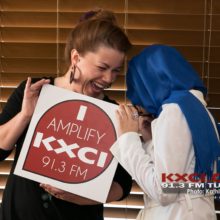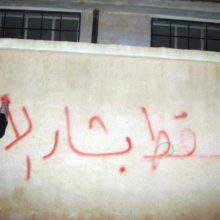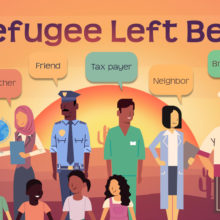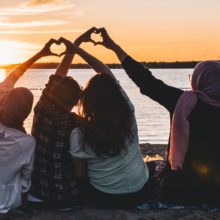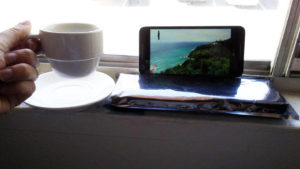
Houda & Melanie refer to Houda’s apartment complex in Tucson as Small Syria—16 Syrian families live there today, but a year ago there were none.
Houda says that when she’s out in Tucson, she feels like she’s in America. But when she comes back home to her complex, she feels like she’s in Syria. In this episode of Mn Huna: Finding Refuge in Friendship, we take you to Small Syria.
There are kids riding bikes, swimming, playing in the open spaces—laughing and chattering in Arabic. Neighbors greet each other in the streets, drop by each other’s homes for a visit, take care of each other’s kids when the parents need to go out. Houda’s dad and their neighbor, Abo Talal, sit in the courtyard at a little table late into the night, chatting, smoking, drinking cups of tea.
The families come from cities all over Syria. In many cases, the homes they left behind were the homes their families had lived in for generations. In Syria, they were embedded in an ancient network of relationships—extended family all around them, neighbors whose families had shared a street for 100 years, family shops owned by generations. In Tucson, they are starting over. Trying to learn the new skill—the very American skill—of creating a new community built of strangers.
They have wildly different backgrounds—socioeconomic class, education, social mores. Some of the women are college-educated. Some are illiterate in Arabic. Some wore full-face niqab in Syria and rarely left the house. Some had full-time jobs outside the home. In Syria, the men were butchers, barbers, accountants, bakers, shopkeepers, executives, drivers, landlords, carpenters, masons, merchants, laborers. In Tucson, they are dishwashers and night-shift janitors.
Their stories of how and why they left Syria are different. Their skills are different. But all of them share a same basic hurt—the hurt of losing their homeland. And all of them share the same challenge—the challenge of creating a new home and a new community here.
هدى/Houda: من هنا : دعونا نكون يد واحدة
Melanie/ميلاني: From here, let us be as one hand.
Listen Now

